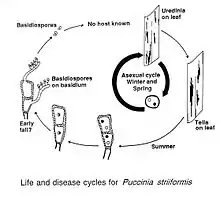Puccinia striiformis var. striiformis
Puccinia striiformis var. striiformis is a plant pathogen. It causes stripe rust on wheat, but has other hosts as well. The species is common in Europe and in more recent years has become a problem in Australia.[1] Infection can cause losses of up to 40%, and the fungus will infect both winter wheat and spring wheat.[2] The taxonomy of Puccinia striiformis was revised in 2010. The commonly called stripe rusts on wheat and grasses were separated into four species based on molecular and morphological studies: Puccinia striiformis sensu stricto (on Aegilops, Elymus, Hordeum and Triticum spp.), Puccinia pseudostriiformis (on Poa spp.), Puccinia striiformoides (on Dactylis spp.) and Puccinia gansensis (on Achnatherum spp.)[3]
| Puccinia striiformis var. striiformis | |
|---|---|
| Scientific classification | |
| Kingdom: | |
| Phylum: | |
| Class: | |
| Subclass: | |
| Order: | |
| Family: | |
| Genus: | |
| Species: | P. striiformis var. striiformis |
| Binomial name | |
| Puccinia striiformis var. striiformis Westend., (1854) | |
| Synonyms | |
|
Dicaeoma glumarum | |
The stripe rust, Puccinia striiformis, can greatly decrease wheat yield in northern Punjab and Khyber Pakhtunkhwa (NWFP).[4]

References
- Roelfs, A. P. and W. R. Bushnell (1984). The Cereal Rusts: Origins, Specificity, Structure and Physiology, Academic Press.
- Cereal Disease Laboraty, ARS
- M. Liu and S. Hambleton (2010) Taxonomic study of stripe rust, Puccinia striiformis sensu lato, based on molecular and morphological evidence. Fungal Biology 114:881-899.
- AFZAL1, SYED NADEEM; et al. (2008). "IMPACT OF STRIPE RUST ON KERNEL WEIGHT OF WHEAT VARIETIES SOWN IN RAINFED AREAS OF PAKISTAN" (PDF). Pakistan Journal of Botany. 40 (2): 923–929. Retrieved 16 April 2012.